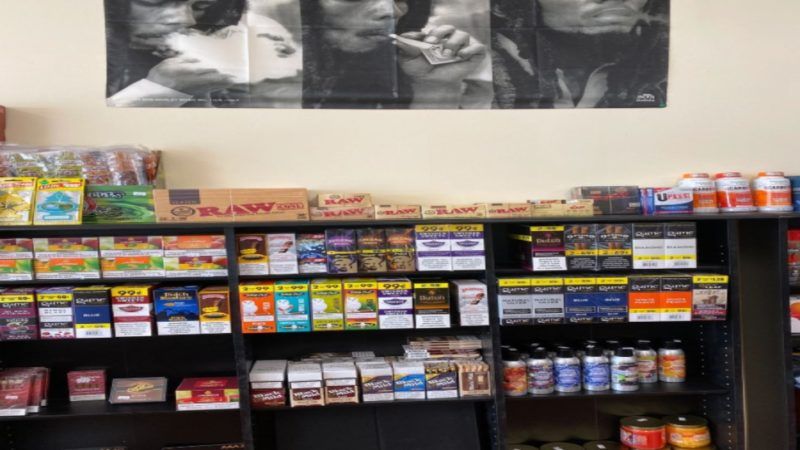Virginia Man Shoots an Active Robber in Store, Is Arrested Himself
The store owner thought his employee acted in reasonable defense of property and self. The police disagreed.

An employee temporarily sleeping in Arlington Smoke Shop in Arlington, Virginia, was arrested early Sunday morning on three charges related to him firing a weapon—one that his boss had supplied to him—at burglars who had broken into the store. He ended up wounding one of the three burglars—a juvenile.
As Arlington Now reports, "Police say a group of three suspects broke into [the] store…and began stealing cash and merchandise." According to police reports, 33-year-old Hamzeh Abushariah then "opened the door to the sales floor and discharged the weapon, striking one juvenile subject. The employee retreated to the back room but reentered the sales floor and discharged his weapon again as the subjects were attempting to flee the business."
The other two burglars escaped on foot, and Abushariah was arrested and charged with malicious wounding, reckless handling of a firearm, and violation of a protective order, as the shooter was, according to police, under a previous order to not legally possess a firearm. Conviction on all three charges could lead to him spending up to 25 years in prison.
Interest in armed self-defense is demonstrably spiking, likely due to fears of criminal unrest in a country where up to one-third of the population suddenly has no income because of COVID-19 economic shutdowns. In such times especially, the notion that using a weapon to defend your business from robbers makes you the criminal unsettles the owner of the smoke shop.
Jowan Zuber, the owner of the store, took to Tucker Carlson Tonight last night to decry the police's actions. "The neighbor upstairs said when they broke the window it sounded like a car smashing into the store. The employee said it sounded like a shotgun," he said to Carlson. "It's very sad for America today as American citizens practice their Second Amendment to protect the store and their lives….Do you know what the [responding] police officer told [Abushariah]? 'Why didn't you run out the back door?'"
According to Zuber, he was not able to post the $25,000 bond for his employee, as it was successfully "appealed by the prosecutor." It's always dangerous to be in jail or prison, for whatever reason, and especially so in the age of COVID-19, something that prosecutors might want to consider more soberly.
The Democratic commonwealth's attorney for the county, Parisa Dehghani-Tafti, has previously been a promoter of maximum transparency in policing but so far has only issued a gnomic statement insisting that the police know things they can't tell us yet that more clearly justify the arrest.
She told local news station WJLA ABC7:
"I cannot ethically discuss an ongoing investigation because doing so would not only risk compromising our work but also unfairly impede on the rights of the accused and interfere with the investigation. Suffice it to say, there is evidence we are not at liberty to share that support the charges, the decision was not made lightly, and we ask the public not to rush to judgment on what is very much a live investigation."
Attorney Marina Medvin of Alexandria, a specialist in self-defense law, says in a phone interview today that she doesn't know enough about the specific facts to know how it will likely turn out. Virginia law depends, she points out, on very fact-specific balancing questions about "reasonableness" of force used and whether the danger the user of a weapon in self-defense faced is "extreme" or if his actions prevented "great bodily harm." It would be a mistake to try to predict a cut-and-dried outcome with the facts the police have released, she says.
Regardless, a 2000 Virginia Supreme Court decision in Virginia v. Alexander that Medvin pointed out is likely bad news for Abushariah's defense, as it concludes "a deadly weapon may not be brandished solely in defense of personal property" in Virginia law.
Whether Abushariah can successfully convince a jury his life was reasonably threatened is uncertain, though perhaps prosecutorial discretion should go to a citizen innocently defending his person and property from robbers. Tens of millions of Americans who own guns for the defense of their lives and property may be wondering the same thing.


Show Comments (94)